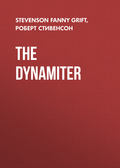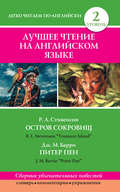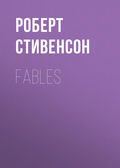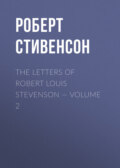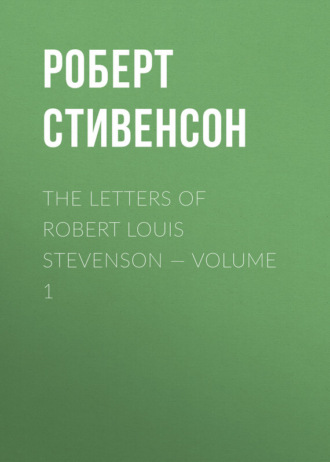
Роберт Льюис Стивенсон
The Letters of Robert Louis Stevenson — Volume 1
'Here lies a man who never did
Anything but what he was bid;
Who lived his life in paltry ease,
And died of commonplace disease.'
To confess plainly, I had intended to spend my life (or any leisure I might have from Piracy upon the high seas) as the leader of a great horde of irregular cavalry, devastating whole valleys. I can still, looking back, see myself in many favourite attitudes; signalling for a boat from my pirate ship with a pocket- handkerchief, I at the jetty end, and one or two of my bold blades keeping the crowd at bay; or else turning in the saddle to look back at my whole command (some five thousand strong) following me at the hand-gallop up the road out of the burning valley: this last by moonlight.
ET POINT DU TOUT. I am a poor scribe, and have scarce broken a commandment to mention, and have recently dined upon cold veal! As for you (who probably had some ambitions), I hear of you living at Dover, in lodgings, like the beasts of the field. But in heaven, when we get there, we shall have a good time, and see some real carnage. For heaven is — must be — that great Kingdom of Antinomia, which Lamb saw dimly adumbrated in the COUNTRY WIFE, where the worm which never dies (the conscience) peacefully expires, and the sinner lies down beside the Ten Commandments. Till then, here a sheer hulk lies poor Tom Bowling, with neither health nor vice for anything more spirited than procrastination, which I may well call the Consolation Stakes of Wickedness; and by whose diligent practice, without the least amusement to ourselves, we can rob the orphan and bring down grey hairs with sorrow to the dust.
This astonishing gush of nonsense I now hasten to close, envelope, and expedite to Shakespeare's Cliff. Remember me to Shakespeare, and believe me, yours very sincerely,
ROBERT LOUIS STEVENSON.
Letter: TO EDMUND GOSSE
LA SOLITUDE, HYERES-LES-PALMIERS, VAR, MARCH 17, 1884
MY DEAR GOSSE, — Your office — office is profanely said — your bower upon the leads is divine. Have you, like Pepys, 'the right to fiddle' there? I see you mount the companion, barbiton in hand, and, fluttered about by city sparrows, pour forth your spirit in a voluntary. Now when the spring begins, you must lay in your flowers: how do you say about a potted hawthorn? Would it bloom? Wallflower is a choice pot-herb; lily-of-the-valley, too, and carnation, and Indian cress trailed about the window, is not only beautiful by colour, but the leaves are good to eat. I recommend thyme and rosemary for the aroma, which should not be left upon one side; they are good quiet growths.
On one of your tables keep a great map spread out; a chart is still better — it takes one further — the havens with their little anchors, the rocks, banks, and soundings, are adorably marine; and such furniture will suit your ship-shape habitation. I wish I could see those cabins; they smile upon me with the most intimate charm. From your leads, do you behold St. Paul's? I always like to see the Foolscap; it is London PER SE and no spot from which it is visible is without romance. Then it is good company for the man of letters, whose veritable nursing Pater-Noster is so near at hand.
I am all at a standstill; as idle as a painted ship, but not so pretty. My romance, which has so nearly butchered me in the writing, not even finished; though so near, thank God, that a few days of tolerable strength will see the roof upon that structure. I have worked very hard at it, and so do not expect any great public favour. IN MOMENTS OF EFFORT, ONE LEARNS TO DO THE EASY THINGS THAT PEOPLE LIKE. There is the golden maxim; thus one should strain and then play, strain again and play again. The strain is for us, it educates; the play is for the reader, and pleases. Do you not feel so? We are ever threatened by two contrary faults: both deadly. To sink into what my forefathers would have called 'rank conformity,' and to pour forth cheap replicas, upon the one hand; upon the other, and still more insidiously present, to forget that art is a diversion and a decoration, that no triumph or effort is of value, nor anything worth reaching except charm. — Yours affectionately,
R. L. S.
Letter: TO MISS FERRIER
LA SOLITUDE, HYERES-LES-PALMIERS, VAR, [MARCH 22, 1884]
MY DEAR MISS FERRIER, — Are you really going to fall us? This seems a dreadful thing. My poor wife, who is not well off for friends on this bare coast, has been promising herself, and I have been promising her, a rare acquisition. And now Miss Burn has failed, and you utter a very doubtful note. You do not know how delightful this place is, nor how anxious we are for a visit. Look at the names: 'The Solitude' — is that romantic? The palm-trees? — how is that for the gorgeous East? 'Var'? the name of a river — 'the quiet waters by'! 'Tis true, they are in another department, and consist of stones and a biennial spate; but what a music, what a plash of brooks, for the imagination! We have hills; we have skies; the roses are putting forth, as yet sparsely; the meadows by the sea are one sheet of jonquils; the birds sing as in an English May — for, considering we are in France and serve up our song- birds, I am ashamed to say, on a little field of toast and with a sprig of thyme (my own receipt) in their most innocent and now unvocal bellies — considering all this, we have a wonderfully fair wood-music round this Solitude of ours. What can I say more? — All this awaits you. KENNST DU DAS LAND, in short. — Your sincere friend,
ROBERT LOUIS STEVENSON.
Letter: TO W. H. LOW
LA SOLITUDE, HYERES-LES-PALMIERS, VAR, [APRIL 1884]
MY DEAR LOW, — The blind man in these sprawled lines sends greeting. I have been ill, as perhaps the papers told you. The news — 'great news — glorious news — sec-ond ed-ition!' — went the round in England.
Anyway, I now thank you for your pictures, which, particularly the Arcadian one, we all (Bob included, he was here sick-nursing me) much liked.
Herewith are a set of verses which I thought pretty enough to send to press. Then I thought of the MANHATTAN, towards whom I have guilty and compunctious feelings. Last, I had the best thought of all — to send them to you in case you might think them suitable for illustration. It seemed to me quite in your vein. If so, good; if not, hand them on to MANHATTAN, CENTURY, or LIPPINCOTT, at your pleasure, as all three desire my work or pretend to. But I trust the lines will not go unattended. Some riverside will haunt you; and O! be tender to my bathing girls. The lines are copied in my wife's hand, as I cannot see to write otherwise than with the pen of Cormoran, Gargantua, or Nimrod. Love to your wife. — Yours ever,
R. L. S.
Copied it myself.
Letter: TO THOMAS STEVENSON
LA SOLITUDE, APRIL 19, 1884
MY DEAR FATHER, — Yesterday I very powerfully stated the HERESIS STEVENSONIANA, or the complete body of divinity of the family theologian, to Miss Ferrier. She was much impressed; so was I. You are a great heresiarch; and I know no better. Whaur the devil did ye get thon about the soap? Is it altogether your own? I never heard it elsewhere; and yet I suspect it must have been held at some time or other, and if you were to look up you would probably find yourself condemned by some Council.
I am glad to hear you are so well. The hear is excellent. The CORNHILLS came; I made Miss Ferrier read us 'Thrawn Janet,' and was quite bowled over by my own works. The 'Merry Men' I mean to make much longer, with a whole new denouement, not yet quite clear to me. 'The Story of a Lie,' I must rewrite entirely also, as it is too weak and ragged, yet is worth saving for the Admiral. Did I ever tell you that the Admiral was recognised in America?
When they are all on their legs this will make an excellent collection.
Has Davie never read GUY MANNERING, ROB ROY, or THE ANTIQUARY? All of which are worth three WAVERLEYS. I think KENILWORTH better than WAVERLEY; NIGEL, too; and QUENTIN DURWARD about as good. But it shows a true piece of insight to prefer WAVERLEY, for it IS different; and though not quite coherent, better worked in parts than almost any other: surely more carefully. It is undeniable that the love of the slap-dash and the shoddy grew upon Scott with success. Perhaps it does on many of us, which may be the granite on which D.'s opinion stands. However, I hold it, in Patrick Walker's phrase, for an 'old, condemned, damnable error.' Dr. Simson was condemned by P. W. as being 'a bagful of' such. One of Patrick's amenities!
Another ground there may be to D.'s opinion; those who avoid (or seek to avoid) Scott's facility are apt to be continually straining and torturing their style to get in more of life. And to many the extra significance does not redeem the strain.
DOCTOR STEVENSON.
Letter: TO COSMO MONKHOUSE
LA SOLITUDE, HYERES, [APRIL 24, 1884]
DEAR MONKHOUSE, — If you are in love with repose, here is your occasion: change with me. I am too blind to read, hence no reading; I am too weak to walk, hence no walking; I am not allowed to speak, hence no talking; but the great simplification has yet to be named; for, if this goes on, I shall soon have nothing to eat — and hence, O Hallelujah! hence no eating. The offer is a fair one: I have not sold myself to the devil, for I could never find him. I am married, but so are you. I sometimes write verses, but so do you. Come! HIC QUIES! As for the commandments, I have broken them so small that they are the dust of my chambers; you walk upon them, triturate and toothless; and with the Golosh of Philosophy, they shall not bite your heel. True, the tenement is falling. Ay, friend, but yours also. Take a larger view; what is a year or two? dust in the balance! 'Tis done, behold you Cosmo Stevenson, and me R. L. Monkhouse; you at Hyeres, I in London; you rejoicing in the clammiest repose, me proceeding to tear your tabernacle into rags, as I have already so admirably torn my own.
My place to which I now introduce you — it is yours — is like a London house, high and very narrow; upon the lungs I will not linger; the heart is large enough for a ballroom; the belly greedy and inefficient; the brain stocked with the most damnable explosives, like a dynamiter's den. The whole place is well furnished, though not in a very pure taste; Corinthian much of it; showy and not strong.
About your place I shall try to find my way alone, an interesting exploration. Imagine me, as I go to bed, falling over a blood- stained remorse; opening that cupboard in the cerebellum and being welcomed by the spirit of your murdered uncle. I should probably not like your remorses; I wonder if you will like mine; I have a spirited assortment; they whistle in my ear o' nights like a north- easter. I trust yours don't dine with the family; mine are better mannered; you will hear nought of them till, 2 A.M., except one, to be sure, that I have made a pet of, but he is small; I keep him in buttons, so as to avoid commentaries; you will like him much — if you like what is genuine.
Must we likewise change religions? Mine is a good article, with a trick of stopping; cathedral bell note; ornamental dial; supported by Venus and the Graces; quite a summer-parlour piety. Of yours, since your last, I fear there is little to be said.
There is one article I wish to take away with me: my spirits. They suit me. I don't want yours; I like my own; I have had them a long while in bottle. It is my only reservation. — Yours (as you decide),
R. L. MONKHOUSE.
Letter: TO W. E. HENLEY
HYERES, MAY 1884
DEAR BOY, — OLD MORTALITY is out, and I am glad to say Coggie likes it. We like her immensely.
I keep better, but no great shakes yet; cannot work — cannot: that is flat, not even verses: as for prose, that more active place is shut on me long since.
My view of life is essentially the comic; and the romantically comic. AS YOU LIKE IT is to me the most bird-haunted spot in letters; TEMPEST and TWELFTH NIGHT follow. These are what I mean by poetry and nature. I make an effort of my mind to be quite one with Moliere, except upon the stage, where his inimitable JEUX DE SCENE beggar belief; but you will observe they are stage-plays — things AD HOC; not great Olympian debauches of the heart and fancy; hence more perfect, and not so great. Then I come, after great wanderings, to Carmosine and to Fantasio; to one part of La Derniere Aldini (which, by the by, we might dramatise in a week), to the notes that Meredith has found, Evan and the postillion, Evan and Rose, Harry in Germany. And to me these things are the good; beauty, touched with sex and laughter; beauty with God's earth for the background. Tragedy does not seem to me to come off; and when it does, it does so by the heroic illusion; the anti-masque has been omitted; laughter, which attends on all our steps in life, and sits by the deathbed, and certainly redacts the epitaph, laughter has been lost from these great-hearted lies. But the comedy which keeps the beauty and touches the terrors of our life (laughter and tragedy-in-a-good-humour having kissed), that is the last word of moved representation; embracing the greatest number of elements of fate and character; and telling its story, not with the one eye of pity, but with the two of pity and mirth.
R. L. S.
Letter: TO EDMUND GOSSE
FROM MY BED, MAY 29, 1884
DEAR GOSSE, — The news of the Professorate found me in the article of — well, of heads or tails; I am still in bed, and a very poor person. You must thus excuse my damned delay; but, I assure you, I was delighted. You will believe me the more, if I confess to you that my first sentiment was envy; yes, sir, on my blood-boltered couch I envied the professor. However, it was not of long duration; the double thought that you deserved and that you would thoroughly enjoy your success fell like balsam on my wounds. How came it that you never communicated my rejection of Gilder's offer for the Rhone? But it matters not. Such earthly vanities are over for the present. This has been a fine well-conducted illness. A month in bed; a month of silence; a fortnight of not stirring my right hand; a month of not moving without being lifted. Come! CA Y EST: devilish like being dead. — Yours, dear Professor, academically,
R. L. S.
I am soon to be moved to Royat; an invalid valet goes with me! I got him cheap — second-hand.
In turning over my late friend Ferrier's commonplace book, I find three poems from VIOL AND FLUTE copied out in his hand: 'When Flower-time,' 'Love in Winter,' and 'Mistrust.' They are capital too. But I thought the fact would interest you. He was no poetist either; so it means the more. 'Love in W.!' I like the best.
Letter: TO MR. AND MRS. THOMAS STEVENSON
HOTEL CHABASSIERE, ROYAT, [JULY 1884]
MY DEAR PEOPLE, — The weather has been demoniac; I have had a skiff of cold, and was finally obliged to take to bed entirely; to-day, however, it has cleared, the sun shines, and I begin to
(SEVERAL DAYS AFTER.)
I have been out once, but now am back in bed. I am better, and keep better, but the weather is a mere injustice. The imitation of Edinburgh is, at times, deceptive; there is a note among the chimney pots that suggests Howe Street; though I think the shrillest spot in Christendom was not upon the Howe Street side, but in front, just under the Miss Graemes' big chimney stack. It had a fine alto character — a sort of bleat that used to divide the marrow in my joints — say in the wee, slack hours. That music is now lost to us by rebuilding; another air that I remember, not regret, was the solo of the gas-burner in the little front room; a knickering, flighty, fleering, and yet spectral cackle. I mind it above all on winter afternoons, late, when the window was blue and spotted with rare rain-drops, and, looking out, the cold evening was seen blue all over, with the lamps of Queen's and Frederick's Street dotting it with yellow, and flaring east-ward in the squalls. Heavens, how unhappy I have been in such circumstances — I, who have now positively forgotten the colour of unhappiness; who am full like a fed ox, and dull like a fresh turf, and have no more spiritual life, for good or evil, than a French bagman.
We are at Chabassiere's, for of course it was nonsense to go up the hill when we could not walk.
The child's poems in a far extended form are likely soon to be heard of — which Cummy I dare say will be glad to know. They will make a book of about one hundred pages. — Ever your affectionate,
R. L. S.
Letter: TO SIDNEY COLVIN
[ROYAT, JULY 1884.]
.. HERE is a quaint thing, I have read ROBINSON, COLONEL JACK, MOLL FLANDERS, MEMOIRS OF A CAVALIER, HISTORY OF THE PLAGUE, HISTORY OF THE GREAT STORM, SCOTCH CHURCH AND UNION. And there my knowledge of Defoe ends — except a book, the name of which I forget, about Peterborough in Spain, which Defoe obviously did not write, and could not have written if he wanted. To which of these does B. J. refer? I guess it must be the history of the Scottish Church. I jest; for, of course, I KNOW it must be a book I have never read, and which this makes me keen to read — I mean CAPTAIN SINGLETON. Can it be got and sent to me? If TREASURE ISLAND is at all like it, it will be delightful. I was just the other day wondering at my folly in not remembering it, when I was writing T. I., as a mine for pirate tips. T. I. came out of Kingsley's AT LAST, where I got the Dead Man's Chest — and that was the seed — and out of the great Captain Johnson's HISTORY OF NOTORIOUS PIRATES. The scenery is Californian in part, and in part CHIC.
I was downstairs to-day! So now I am a made man — till the next time.
R. L. STEVENSON.
If it was CAPTAIN SINGLETON, send it to me, won't you?
LATER. — My life dwindles into a kind of valley of the shadow picnic. I cannot read; so much of the time (as to-day) I must not speak above my breath, that to play patience, or to see my wife play it, is become the be-all and the end-all of my dim career. To add to my gaiety, I may write letters, but there are few to answer. Patience and Poesy are thus my rod and staff; with these I not unpleasantly support my days.
I am very dim, dumb, dowie, and damnable. I hate to be silenced; and if to talk by signs is my forte (as I contend), to understand them cannot be my wife's. Do not think me unhappy; I have not been so for years; but I am blurred, inhabit the debatable frontier of sleep, and have but dim designs upon activity. All is at a standstill; books closed, paper put aside, the voice, the eternal voice of R. L. S., well silenced. Hence this plaint reaches you with no very great meaning, no very great purpose, and written part in slumber by a heavy, dull, somnolent, superannuated son of a bedpost.
CHAPTER VII — LIFE AT BOURNEMOUTH, SEPTEMBER 1884-DECEMBER 1885
Letter: TO MR. AND MRS. THOMAS STEVENSON
WENSLEYDALE, BOURNEMOUTH, SUNDAY, 28TH SEPTEMBER 1884
MY DEAR PEOPLE, — I keep better, and am to-day downstairs for the first time. I find the lockers entirely empty; not a cent to the front. Will you pray send us some? It blows an equinoctial gale, and has blown for nearly a week. Nimbus Britannicus; piping wind, lashing rain; the sea is a fine colour, and wind-bound ships lie at anchor under the Old Harry rocks, to make one glad to be ashore.
The Henleys are gone, and two plays practically done. I hope they may produce some of the ready. — I am, ever affectionate son,
R. L. S.
Letter: TO W. E. HENLEY
[WENSLEYDALE, BOURNEMOUTH, OCTOBER 1884?]
DEAR BOY, — I trust this finds you well; it leaves me so-so. The weather is so cold that I must stick to bed, which is rotten and tedious, but can't be helped.
I find in the blotting book the enclosed, which I wrote to you the eve of my blood. Is it not strange? That night, when I naturally thought I was coopered, the thought of it was much in my mind; I thought it had gone; and I thought what a strange prophecy I had made in jest, and how it was indeed like to be the end of many letters. But I have written a good few since, and the spell is broken. I am just as pleased, for I earnestly desire to live. This pleasant middle age into whose port we are steering is quite to my fancy. I would cast anchor here, and go ashore for twenty years, and see the manners of the place. Youth was a great time, but somewhat fussy. Now in middle age (bar lucre) all seems mighty placid. It likes me; I spy a little bright cafe in one corner of the port, in front of which I now propose we should sit down. There is just enough of the bustle of the harbour and no more; and the ships are close in, regarding us with stern-windows — the ships that bring deals from Norway and parrots from the Indies. Let us sit down here for twenty years, with a packet of tobacco and a drink, and talk of art and women. By-and-by, the whole city will sink, and the ships too, and the table, and we also; but we shall have sat for twenty years and had a fine talk; and by that time, who knows? exhausted the subject.
I send you a book which (or I am mistook) will please you; it pleased me. But I do desire a book of adventure — a romance — and no man will get or write me one. Dumas I have read and re-read too often; Scott, too, and I am short. I want to hear swords clash. I want a book to begin in a good way; a book, I guess, like TREASURE ISLAND, alas! which I have never read, and cannot though I live to ninety. I would God that some one else had written it! By all that I can learn, it is the very book for my complaint. I like the way I hear it opens; and they tell me John Silver is good fun. And to me it is, and must ever be, a dream unrealised, a book unwritten. O my sighings after romance, or even Skeltery, and O! the weary age which will produce me neither!
CHAPTER I
The night was damp and cloudy, the ways foul. The single horseman, cloaked and booted, who pursued his way across Willesden Common, had not met a traveller, when the sound of wheels -
CHAPTER I
'Yes, sir,' said the old pilot, 'she must have dropped into the bay a little afore dawn. A queer craft she looks.'
'She shows no colours,' returned the young gentleman musingly.
'They're a-lowering of a quarter-boat, Mr. Mark,' resumed the old salt. 'We shall soon know more of her.'
'Ay,' replied the young gentleman called Mark, 'and here, Mr.
Seadrift, comes your sweet daughter Nancy tripping down the cliff.'
'God bless her kind heart, sir,' ejaculated old Seadrift.
CHAPTER I
The notary, Jean Rossignol, had been summoned to the top of a great house in the Isle St. Louis to make a will; and now, his duties finished, wrapped in a warm roquelaure and with a lantern swinging from one hand, he issued from the mansion on his homeward way. Little did he think what strange adventures were to befall him! -
That is how stories should begin. And I am offered HUSKS instead.
What should be: What is:
The Filibuster's Cache. Aunt Anne's Tea Cosy.
Jerry Abershaw. Mrs. Brierly's Niece.
Blood Money: A Tale. Society: A Novel
R. L. S.
Letter: TO THE REV. PROFESSOR LEWIS CAMPBELL
[WENSLEYDALE, BOURNEMOUTH, NOVEMBER 1884.]
MY DEAR CAMPBELL, — The books came duly to hand. My wife has occupied the translation ever since, nor have I yet been able to dislodge her. As for the primer, I have read it with a very strange result: that I find no fault. If you knew how, dogmatic and pugnacious, I stand warden on the literary art, you would the more appreciate your success and my — well, I will own it — disappointment. For I love to put people right (or wrong) about the arts. But what you say of Tragedy and of Sophocles very amply satisfies me; it is well felt and well said; a little less technically than it is my weakness to desire to see it put, but clear and adequate. You are very right to express your admiration for the resource displayed in OEdipus King; it is a miracle. Would it not have been well to mention Voltaire's interesting onslaught, a thing which gives the best lesson of the difference of neighbour arts? — since all his criticisms, which had been fatal to a narrative, do not amount among them to exhibit one flaw in this masterpiece of drama. For the drama, it is perfect; though such a fable in a romance might make the reader crack his sides, so imperfect, so ethereally slight is the verisimilitude required of these conventional, rigid, and egg-dancing arts.
I was sorry to see no more of you; but shall conclude by hoping for better luck next time. My wife begs to be remembered to both of you. — Yours sincerely,
ROBERT LOUIS STEVENSON
Letter: TO ANDREW CHATTO
WENSLEYDALE, BOURNEMOUTH, OCTOBER 3, 1884
DEAR MR. CHATTO, — I have an offer of 25 pounds for OTTO from America. I do not know if you mean to have the American rights; from the nature of the contract, I think not; but if you understood that you were to sell the sheets, I will either hand over the bargain to you, or finish it myself and hand you over the money if you are pleased with the amount. You see, I leave this quite in your hands. To parody an old Scotch story of servant and master: if you don't know that you have a good author, I know that I have a good publisher. Your fair, open, and handsome dealings are a good point in my life, and do more for my crazy health than has yet been done by any doctor. — Very truly yours,
ROBERT LOUIS STEVENSON.
Letter: TO W. H. LOW
BONALLIE TOWERS, BRANKSOME PARK, BOURNEMOUTH, HANTS, ENGLAND, FIRST WEEK IN NOVEMBER, I GUESS, 1884
MY DEAR LOW, — NOW, look here, the above is my address for three months, I hope; continue, on your part, if you please, to write to Edinburgh, which is safe; but if Mrs. Low thinks of coming to England, she might take a run down from London (four hours from Waterloo, main line) and stay a day or two with us among the pines. If not, I hope it will be only a pleasure deferred till you can join her.
My Children's Verses will be published here in a volume called A CHILD'S GARDEN. The sheets are in hand; I will see if I cannot send you the lot, so that you might have a bit of a start. In that case I would do nothing to publish in the States, and you might try an illustrated edition there; which, if the book went fairly over here, might, when ready, be imported. But of this more fully ere long. You will see some verses of mine in the last MAGAZINE OF ART, with pictures by a young lady; rather pretty, I think. If we find a market for PHASELLULUS LOQUITUR, we can try another. I hope it isn't necessary to put the verse into that rustic printing. I am Philistine enough to prefer clean printer's type; indeed, I can form no idea of the verses thus transcribed by the incult and tottering hand of the draughtsman, nor gather any impression beyond one of weariness to the eyes. Yet the other day, in the CENTURY, I saw it imputed as a crime to Vedder that he had not thus travestied Omar Khayyam. We live in a rum age of music without airs, stories without incident, pictures without beauty, American wood engravings that should have been etchings, and dry-point etchings that ought to have been mezzo-tints. I think of giving 'em literature without words; and I believe if you were to try invisible illustration, it would enjoy a considerable vogue. So long as an artist is on his head, is painting with a flute, or writes with an etcher's needle, or conducts the orchestra with a meat-axe, all is well; and plaudits shower along with roses. But any plain man who tries to follow the obtrusive canons of his art, is but a commonplace figure. To hell with him is the motto, or at least not that; for he will have his reward, but he will never be thought a person of parts.
JANUARY 3, 1885.
And here has this been lying near two months. I have failed to get together a preliminary copy of the Child's Verses for you, in spite of doughty efforts; but yesterday I sent you the first sheet of the definitive edition, and shall continue to send the others as they come. If you can, and care to, work them — why so, well. If not, I send you fodder. But the time presses; for though I will delay a little over the proofs, and though — it is even possible they may delay the English issue until Easter, it will certainly not be later. Therefore perpend, and do not get caught out. Of course, if you can do pictures, it will be a great pleasure to me to see our names joined; and more than that, a great advantage, as I daresay you may be able to make a bargain for some share a little less spectral than the common for the poor author. But this is all as you shall choose; I give you CARTE BLANCHE to do or not to do. — Yours most sincerely,
ROBERT LOUIS STEVENSON.
O, Sargent has been and painted my portrait; a very nice fellow he is, and is supposed to have done well; it is a poetical but very chicken-boned figure-head, as thus represented. R. L. S. Go on.
P.P.S. — Your picture came; and let me thank you for it very much.
I am so hunted I had near forgotten. I find it very graceful; and
I mean to have it framed.
Letter: TO THOMAS STEVENSON
BONALLIE TOWERS, BOURNEMOUTH, NOVEMBER 1884
MY DEAR FATHER, — I have no hesitation in recommending you to let your name go up; please yourself about an address; though I think, if we could meet, we could arrange something suitable. What you propose would be well enough in a way, but so modest as to suggest a whine. From that point of view it would be better to change a little; but this, whether we meet or not, we must discuss. Tait, Chrystal, the Royal Society, and I, all think you amply deserve this honour and far more; it is not the True Blue to call this serious compliment a 'trial'; you should be glad of this recognition. As for resigning, that is easy enough if found necessary; but to refuse would be husky and unsatisfactory. SIC SUBS.



